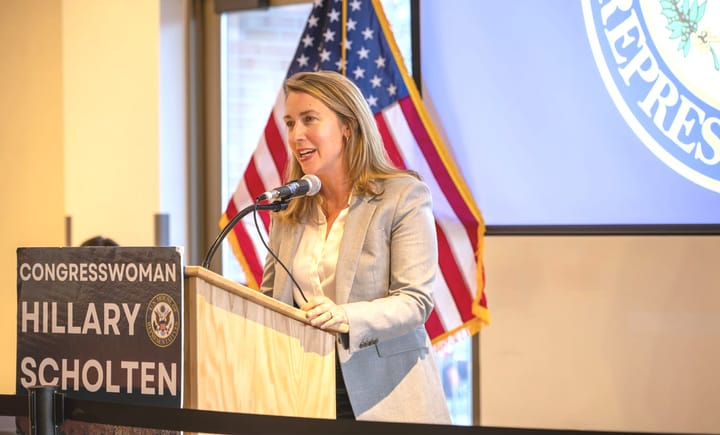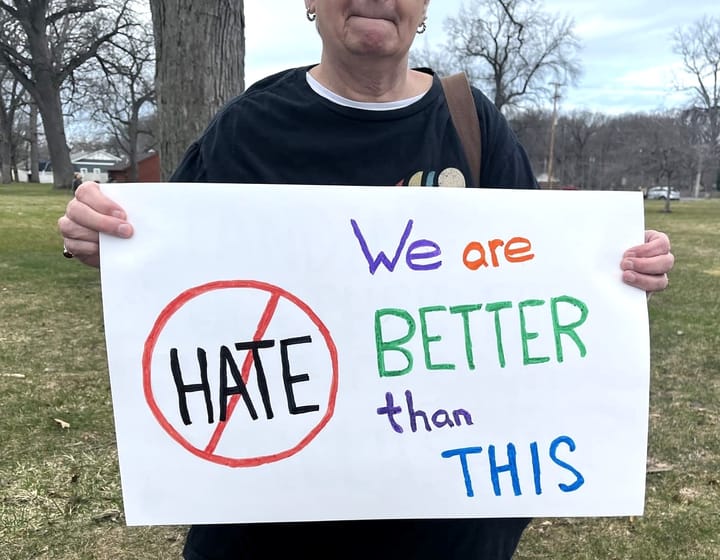Ottawa commissioner amends lawsuit against MSU Extension to include Ottawa Impact leader
New filing claims Joe Moss 'retaliated against (Kleinjans) for his protected speech by refusing to adopt the renewal contract.'

EDITOR’S NOTE: This story has been updated to correct that the plaintiff in this case is allowed a first amendment to the complaint without the court’s approval.
LANSING — Just days after a judge denied Ottawa County’s newest commissioner’s request to be reinstated to his position at Michigan State University’s Extension office, a new defendant has been added: County board Chair Joe Moss.
Kleinjans’ attorney, Sarah Riley-Howard, said Moss violated Kleinjans’ First Amendment rights when he “retaliated against (Kleinjans) for his protected speech by refusing to adopt the renewal contract” with MSU Extension, according to a new court filing Tuesday, Aug. 20, in the U.S. Western District Court.
Read More: Judge blocks Kleinjans' request to be reinstated to MSU Extension post
“Moss’ decision to remove the contract from the consent agenda and hold up the adoption of the contract for several months was made in an effort to retaliate against (Kleinjans) for his political speech by withholding funds from (Kleinjans’) employer,” according to the new filing.

Federal Judge Hala Y. Jarbou ruled Aug. 15 that Kleinjans had not definitively proven that MSU Extension fired Kleinjans to “bow” to political pressure from the current Ottawa Impact majority on the board, which Moss leads.
In her ruling, Jarbou said Moss, who also is the president and founder of Ottawa Impact, “began to exert pressure on MSU Extension to terminate or relocate Kleinjans” in order to “threaten the approval of the (memorandum of understanding)” with the school.
Moss has not returned several requests for comment in relation to the Kleinjans v. MSU lawsuit.
Ottawa Impact is a far-right fundamentalist group formed in 2021 over frustrations with the county and state over COVID-19 mitigation measures.
Since taking office in January 2023, OI commissioners pushed through a series of controversial decisions, resulting in several lawsuits against the county.
After being seated, “they immediately began making … charitably speaking … aggressive decisions,” Kleinjans said in testimony Aug. 9 during an evidentiary hearing in the Western District’s courthouse in Lansing. “It was a different interpretation of freedom than what we were operating under before.”
Where the lawsuit is at
Jarbou said it is “undisputed that the OI majority sought political retribution against Kleinjans” because of his comments about OI and involvement in the recall effort of Lucy Ebel, who he ultimately defeated in May by a 20% margin.
However, because MSU refused to grant Moss’ requests, a clear connection showing that Kleinjans’ political activity was the reason Extension fired him was required for her to order the school to restore the Democrat to his position as a longtime nutritional instructor.
“Had OI been successful, Kleinjans would likely have a clear-cut case for First Amendment retaliation,” Jarbou wrote. “He would certainly have shown a sufficient likelihood of success on the merits to obtain a preliminary injunction. But OI was not successful — Defendants rebuffed OI’s retaliatory effort. In other words, Defendants protected Kleinjans’s First Amendment rights in the face of pressure from OI. And Kleinjans does not show what, if anything, changed for Defendants between January and May.”

The ruling only applied to Howard’s request for a preliminary injunction for her client to be reinstated to his position as well as back pay dating from his June 4 termination date. The lawsuit will now continue to move forward.
Testimony about Moss’ actions
Kleinjans filed the lawsuit on June 21 claiming Extension violated his First Amendment rights after giving him an ultimatum after he was elected in a special recall election May 7: Take an unpaid leave through the remainder of the year or face termination.
Read More: Was Ottawa County's newest commissioner punished for running?
An Aug. 9 evidentiary hearing featured testimony from Kleinjans and two of three MSU Extension supervisors who had several conversations with Kleinjans from before he was a commissioner candidate to after he was elected in a special recall election on May 7.
Testimony on Aug. 9 by M. Scott Korpak, the new District 7 director, confirmed that during a Dec. 7 meeting he had with then-interim director James Kelly as well as Moss and OI Commissioner Allison Miedema where the commissioners “threatened” the MOU, or annually renewed contract between Extension and the county.
When Associate Director of the Extension’s field operations Matt Shane met with Kleinjans on Dec. 14 to summarize the meeting between Moss, Miedema, Korpak and Kelly, he said Moss “asked that MSU Extension officials pull (Kleinjans) out of work in Ottawa County even during his campaign for office in the recall election, and that MSU Extension move (Kleinjans) to another county, another location, or some other work,” according to the amended complaint.
Sentinel Leach is a reader-supported publication. To receive new posts and support my work, consider becoming a free or paid subscriber.
At the Aug. 9 evidentiary hearing, Howard submitted three recordings Kleinjans made of meetings with Extension leadership — on Nov. 27, Dec. 14 and May 23 — which were first publicly published on SentinelLeach on June 17.
Shane also told Kleinjans that Miedema and Moss “said that the MSU Extension contract renewal would not be approved by the commission or on the agenda until MSU Extension removed (Kleinjans) from work in Ottawa County.”
When asked at the Aug. 9 hearing how he interpreted Moss addressing Kleinjans’ employment, Korpak said: “You could characterize it as a veiled threat … of concern with Christian’s involvement in the recall process. … They were unhappy about his political activity.”

Amended Kleinjans v. MSU complaint 08.20.24208KB ∙ PDF fileDownloadRead the amended complaint in the Kleinjans lawsuit against MSU Extension, which requests to add Ottawa County Board Chair Joe Moss as a defendant.Download
Korpak also testified that it was the second instance that Moss brought up “concerns” about Kleinjans, the first being in the lobby of the county’s administration building in West Olive prior to the board’s Nov. 21 meeting.
“He shared his concerns about Christian’s efforts against Ms. Ebel,” Korpak said of the Nov. 21 conversation.
“Because he’s a Democrat?” Howard asked.
“Yes, among other concerns,” Korpak replied.
Office space possibly at risk
Shane also told Kleinjans on Dec. 14 that Miedema and Moss “insinuated” that Extension’s office space provided by Ottawa County “would be in jeopardy,” according to the amended complaint.
“There was also some mention in that meeting about how highly desirable our Ottawa County MSU Extension space is in that building, and that there are other departments that certainly would benefit from having access to that space as they look at restructuring some of their other departments and forming other departments and offices within the county,” Shane said in the Dec. 14 recording.

At the Aug 9 evidentiary hearing, Korpak said Extension currently is evaluating its space needs at the county’s request, which is due by the end of August.
What wasn’t addressed in testimony during the hearing, but is included in the new amended complaint, is the allegation that sometime after the May 7 recall election, Interim County Administrator Jon Anderson visited the office of MSU Extension in Ottawa County “made a public display of coming to examine the office for the purpose of moving another county department into it and MSU Extension out of it.”
Anderson was appointed by the OI majority in April after previous administrator John Gibbs was fired in February. The appointment was controversial because Anderson didn’t have any prior experience as a county administrator, already was a declared OI-backed candidate for county sheriff, prompting critics to claim at several public meetings that the decision was intended to elevate Anderson’s profile to better his election chances.
Anderson lost to Undersheriff Eric DeBoer in the Aug. 6 primary by 20 points.
Howard said Anderson’s comments to the Extension staff were “intended to be a threat of retaliation” to Kleinjans’ employer.

“Anderson declared — in front of MSU Extension employees — that the county would need at least some, if not all, of the office space currently inhabited by MSU Extension for new county departments that the OI majority intended to create or to make room for an office shuffle,” according to the amended complaint.
According to the amended complaint, Anderson said that “‘maybe’ the county would move the MSU Extension Office to the basement of the building housing the MDHHS’s Ottawa County location” on James Street in Holland. The MDHHS building is located at the edge of the County in Holland.”
Howard argued that Anderson’s “visit to the office space and threat that MSU Extension would be relocated by the county was a continuation of the original, overt threat voiced by Moss in the Dec. 7 meeting,” according to the amended complaint.
Howard cited an additional communication — this time an email sent to from Anderson to Kleinjans on June 6, which was two days after Kleinjans’ last day with Extension — as evidence that the OI majority intended continue to interfere with Kleinjans’ employment.
Anderson’s email said: “Hi Chris – hope all is well and you’re settling in. I had a reminder from my notes to check with you about your position with MSU. I do not have any personal knowledge about a potential conflict of interest, but I recall there was a question about a potential conflict of interest when you were elected. If there is anything you need, please reach out.”
Howard said the timing and substance of the communication was odd because there had been no previous mention in public meetings about a conflict of interest with Kleinjans’ board service and his job with Extension.

“The most likely reason that Anderson would have raised this issue with (Kleinjans) is because of private direction from the OI majority related to (Kleinjans’) job,” Howard wrote in the amended complaint.
What happens next
According to Cornell Law School’s Legal Information Institute, a plaintiff is allowed to amend their complaint, one time within 21 days of serving the original complaint or at any point before the defendant answers the complaint. In all other circumstances, the plaintiff must seek consent of the court or consent from the defendant to amend the original complaint.
So far, MSU has answered only the motion requesting the preliminary injunction, so Moss has been successfully added to the litigation. Moss now has 21 days to respond to the lawsuit and MSU now has an additional seven days to respond to the overall complaint because another defendant was added.
Howard has asked that MSU pay Kleinjans back wages as well as punitive damages as well as his attorney fees. Against Moss, Howard has asked that the court award appropriate damages and to rule that Moss “must discontinue efforts to retaliate against political opponents for the protected conduct, and award appropriate injunctive relief.”
The court has not yet scheduled additional court dates.
— Contact Sarah Leach at SentinelLeach@gmail.com. Follow her on Twitter @SentinelLeach. Subscribe to her content at sentinelleach.substack.com.



